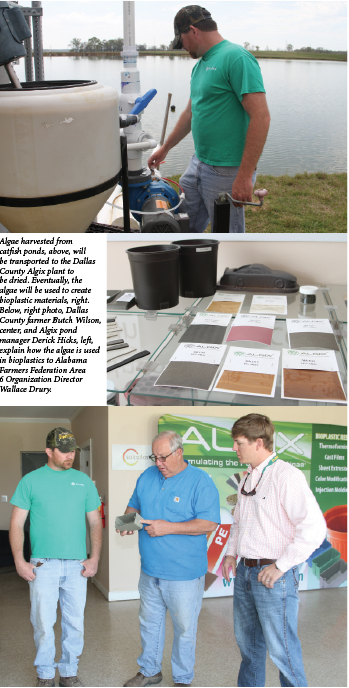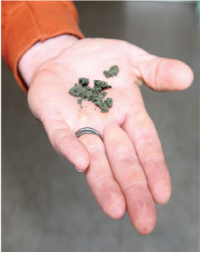Scraping Up Profits: Company Turns Green Scum Into Greenbacks
Lurking in the depths of catfish ponds across the Southeast may be hidden profits from partially biodegradable plastics, or bioplastics. With an algae harvester developed by Georgia-based company Algix LLC, farmers could soon unlock that potential.
Dallas County Farmers Federation Director Butch Wilson is testing the harvester at his farm, just a few miles away from a new algae drying plant.

“We’re taking something considered waste and turning it into an actual product,” said Wilson, who serves as a pond manager for Algix. “This is a way to give back to the Earth.”
Through a series of steps, the harvested mucky, green algae is harvested, dried and made into p
ellets. Manufacturing companies use the pellets to make bioplastic materials containing a percentage of algae.
“Car bumpers, plant containers, plastic field covers — anything made from plastic can be made using these pellets,” said Derick Hicks, another pond manager with Algix.
When discarded, the algae component of the bioplastic decomposes in landfills. Along with large-scale environmental benefits, bioplastics could help catfish farmers prosper.
Algix places harvesters at ponds for no cost, and farmers are paid for the dried algae and reimbursed for electricity used for harvesting.
Algae grow naturally in most water habitats and provide oxygen for aquatic life. However, the microscopic plants can cause problems, so farmers use approved chemicals to control algae growth.
“We call it ‘mowing the grass,’” Wilson said. “Algae are one of the fastest growing plants on Earth. All they need is sunshine and fertilizer to grow, and we fertilize the water every day when we feed our fish.”
Along with payments, algae harvesting could help farmers save time and money by using less chemicals. Algae sometimes delay harvests by creating an undesirable fish flavor, known as “off-flavor.” According to the U.S. Animal and Plant Health Inspection Service, delays from off-flavor add $15 to $23 million in annual production costs to catfish farmers in Mississippi. No figures are available for Alabama.
“In the months we’ve been testing this technology, it seems the harvester helps pond water quality and helps the fish maintain a good flavor,” Hicks said.
Pond water is tested to determine algae concentration and requires a certain threshold for harvest, Hicks said. A machine mounted on a trailer moves easily among ponds. Water cycled through the harvester is highly oxygenated before it’s pumped back into the pond.

Algix truck drivers are responsible for algae pickup at farms and delivery to the Dallas County drying plant. When completed, the facility is expected to accept algae harvests from 10,000 acres of ponds.
Two industrial-strength driers at the plant turn the algae from a soggy, green substance to hard pebbles, which are then taken to the pellet-making facility in Meridian, Mississippi.
“This process creates a revenue stream farmers haven’t had before and can cut down on expenses to control algae,” Wilson said. “This is really a win-win, and at no additional cost to the farmer.”
For more information on Algix, visit Algix.com or call (877) 972-5449.
